小学六年级英语全册总复习资料
六年级英语总复习资料

六年级英语总复习资料
基础知识
英语基础词汇、语法和句型要牢固掌握,建议重点复以下内容:
- 名词、代词、形容词、副词等词性的基本概念和用法
- 一般现在时、一般过去时、将来时以及现在进行时的构成和
用法
- 疑问句、否定句等句型的构成和用法
- 数字、日期、时间、颜色、天气等日常应用词汇的拼写和发
音
听力练
听力部分占据英语考试的相当部分,所以要多进行一些听力练,以提高听力水平。
以下是一些备选的听力材料:
- 英语流行歌曲
- 网络语音练素材
- 录音机录制自身朗读的英语材料
口语练
英语口语练是提高英语水平的重要途径,建议多进行一些口语练,同时在口语练中寻求不同的交流场合,以提高英语表达能力。
可以选择以下口语练方式:
- 和外教进行一对一口语练
- 参加英语口语角
- 加入英语社区,在社区中交流和分享研究心得
阅读练
阅读是提高英语理解和阅读能力的重要途径,可以多选择以下练方式:
- 阅读英文书籍,建议选择适合阅读水平的英文原著
- 阅读英文新闻,建议选择有词汇注释的新闻网站
- 阅读英文杂志,建议选择感兴趣的主题材料
写作练
写作是提高英语表达能力和阅读能力的重要途径,可以选择以下练方式:
- 写博客,分享自己的研究心得和经验
- 每日写作练,就一些简单的主题写下自己的想法和感受
- 参加英语写作比赛,切磋提高自己的水平
总结
以上是六年级英语总复习资料的一些建议和练习方法,需要进行有节奏的训练,多角度全方位提高英语水平,从而取得满意的成绩。
人教版新版小学六年级英语上册全册学习资料
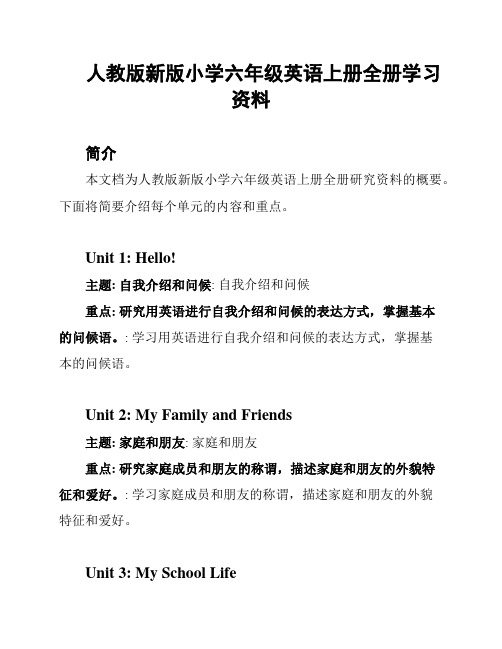
人教版新版小学六年级英语上册全册学习资料简介本文档为人教版新版小学六年级英语上册全册研究资料的概要。
下面将简要介绍每个单元的内容和重点。
Unit 1: Hello!主题: 自我介绍和问候: 自我介绍和问候重点: 研究用英语进行自我介绍和问候的表达方式,掌握基本的问候语。
: 学习用英语进行自我介绍和问候的表达方式,掌握基本的问候语。
Unit 2: My Family and Friends主题: 家庭和朋友: 家庭和朋友重点: 研究家庭成员和朋友的称谓,描述家庭和朋友的外貌特征和爱好。
: 学习家庭成员和朋友的称谓,描述家庭和朋友的外貌特征和爱好。
Unit 3: My School Life主题: 我的校园生活: 我的校园生活重点: 研究描述学校、教室、课程和活动的词汇,了解在校生活中的常见场景。
: 学习描述学校、教室、课程和活动的词汇,了解在校生活中的常见场景。
Unit 4: Leisure Time主题: 休闲时间: 休闲时间重点: 研究谈论休闲活动和爱好,了解并运用动词的ing形式。
: 学习谈论休闲活动和爱好,了解并运用动词的ing形式。
Unit 5: Let's Celebrate!主题: 节日庆祝: 节日庆祝重点: 研究讨论各种节日和庆祝活动,掌握相应的表达方式和词汇。
: 学习讨论各种节日和庆祝活动,掌握相应的表达方式和词汇。
Unit 6: Nature and Environment主题: 自然和环境: 自然和环境重点: 研究描述动物、植物和环境的词汇,了解一些自然保护的知识。
: 学习描述动物、植物和环境的词汇,了解一些自然保护的知识。
总结本册教材包含了六个单元的研究内容,涵盖了日常生活中常见的话题。
通过研究这些内容,学生将能够掌握基本的英语交流能力,并丰富自己的词汇量。
希望本册教材能对学生的英语研究有所帮助。
以上是《人教版新版小学六年级英语上册全册学习资料》的简要介绍。
如需详细内容,请参阅教材。
六年级英语总复习资料内容
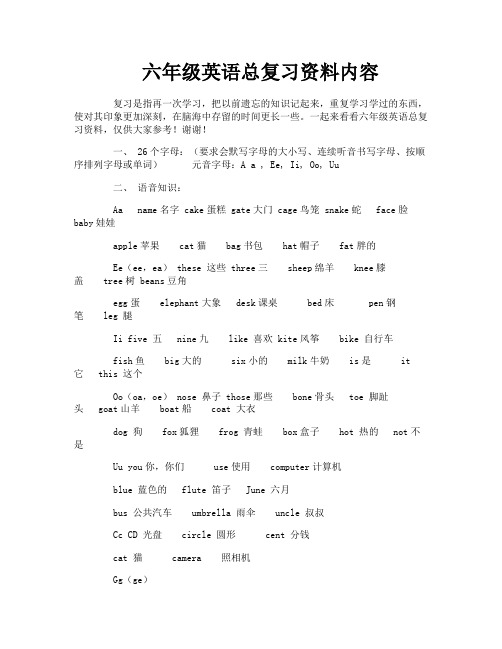
六年级英语总复习资料内容复习是指再一次学习,把以前遗忘的知识记起来,重复学习学过的东西,使对其印象更加深刻,在脑海中存留的时间更长一些。
一起来看看六年级英语总复习资料,仅供大家参考!谢谢!一、 26个字母:(要求会默写字母的大小写、连续听音书写字母、按顺序排列字母或单词)元音字母:A a , Ee, Ii, Oo, Uu二、语音知识:Aa name名字 cake蛋糕 gate大门 cage鸟笼 snake蛇face脸baby娃娃apple苹果 cat猫 bag书包 hat帽子 fat胖的Ee(ee,ea) these 这些 three三 sheep绵羊 knee膝盖 tree树 beans豆角egg蛋 elephant大象desk课桌bed床 pen钢笔 leg 腿Ii five 五nine九 like 喜欢 kite风筝 bike 自行车fish鱼 big大的six小的 milk牛奶 is是it它this 这个Oo(oa,oe) nose 鼻子 those那些 bone骨头toe 脚趾头goat山羊 boat船 coat 大衣dog 狗 fox狐狸 frog 青蛙 box盒子 hot 热的not不是Uu you你,你们use使用 computer计算机blue 蓝色的flute 笛子June 六月bus 公共汽车 umbrella 雨伞 uncle 叔叔Cc CD 光盘 circle 圆形cent 分钱cat 猫camera 照相机Gg(ge)orange 桔子 giraffe 长颈鹿page 页frog 青蛙 girl 女孩big 大的gate 大门th thin 瘦的 three 三thirteen 十三mouth 嘴mother 妈妈 father 爸爸 brother 兄弟 they 他们this 这个 that 那个feather 羽毛whwhat 什么 when 什么时候where 哪里why 为什么which 哪一个white 白色的water水 woman 女人walk 走who 谁whose 谁的ar car 汽车park 公园farm 农场arm手臂 star星星ir girl 女孩bird 鸟nurse护士purse 钱包 turtle 海龟third第三hurt 疼ow cow奶牛owl 猫头鹰house 房子mouse 鼠,鼠标cloudy 多云的oyoi boy 男孩 toy 玩具 oyster 贝壳oil 油coin 硬币 boil 沸腾oroor horse 马 store 商店 corn 玉米door 门floor 地板airear chair 椅子hair 头发 pear 梨bear 熊oobook 书 good 好的 look 看 foot 脚moon 月亮 food 食物pool 池子 room房间字母s或es的发音:字母s在词首发音为/s/, 在中间如:usually, television, treasure, casual中发音为/ /;以/p/, /t/, /k/ 清音收尾,读音为/s/;其他情况一般读音为/z/;以s, x, ch, sh 收尾加es的,es读音为/iz/。
小学英语复习资料[完整版]
![小学英语复习资料[完整版]](https://img.taocdn.com/s3/m/1e3a1fe976eeaeaad0f33007.png)
小学六年级英语复习资料一、语法:不可数名词(本身不能表示复数,常为物质名词或抽象名词),如:milk 、meat 、 coffee、rice 、cheese 、soup 、bread 、hair 、fruit 、time 、Chinese 、English 、Japanese单数(如:book 、box 、boy )单数可数名词可以在它前面用a/an.如:可数名词 a book 一本书 an eraser 一个铅笔檫 an English book 一本英语书 an American boy一个美国男孩 an apple/orange 一颗苹果/桔子 an eye/ear 一只眼睛/耳朵 an old doctoran uncle an E-mail (a 用在辅音之前,an 用在元音之前)复数(特殊的:man- men woman -women policeman- policemen child -children foot- feet this-these that- those )名词复数的构成形式(二)、主要人称代词、物主代词的基本用法。
1、人称代词的数与格:2、物主代词:表示所有关系,分名词性物主代词和形容词性物主代词。
名词性物主代词相当于一个名词,可以单独使用,形容词性物主代词不能单独使用,后面必须加名词。
1、介词at 的用法:A:用在几点钟之前。
eg:Mr Liu gets up at six o’clock.B:在“night”前用at。
eg:The monkeys are tired at night.C:表示空间,在…. eg:Let’s meet at the bus stop at five o’clock.D:表示地点:at home at school at the bus stop.2、介词in的用法:A:in the moming/afternoon/evening.B: “in”在…里面。
人教版小学六年级下册英语课文复习资料全册
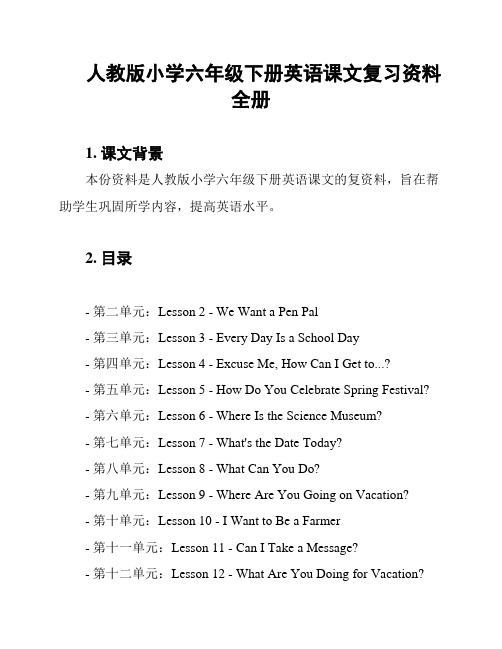
人教版小学六年级下册英语课文复习资料全册1. 课文背景本份资料是人教版小学六年级下册英语课文的复资料,旨在帮助学生巩固所学内容,提高英语水平。
2. 目录- 第二单元:Lesson 2 - We Want a Pen Pal- 第三单元:Lesson 3 - Every Day Is a School Day- 第四单元:Lesson 4 - Excuse Me, How Can I Get to...?- 第五单元:Lesson 5 - How Do You Celebrate Spring Festival?- 第六单元:Lesson 6 - Where Is the Science Museum?- 第七单元:Lesson 7 - What's the Date Today?- 第八单元:Lesson 8 - What Can You Do?- 第九单元:Lesson 9 - Where Are You Going on Vacation?- 第十单元:Lesson 10 - I Want to Be a Farmer- 第十一单元:Lesson 11 - Can I Take a Message?- 第十二单元:Lesson 12 - What Are You Doing for Vacation?- 第十三单元:Lesson 13 - Give Me Some Advice, Please- 第十四单元:Lesson 14 - What Do You Want to Be in the Future?- 第十五单元:Lesson 15 - Travelling Around the World3. 使用说明学生可根据自己的研究进度选择相应的单元进行复。
每个单元包含一个课文的标题,通过阅读课文并进行练,学生可以巩固词汇、句型和语法等方面的知识。
4. 复方法为了有效地进行复,建议学生采取以下策略:- 阅读课文:仔细阅读每个课文,理解内容和语法结构。
新人教版PEP小学英语六年级总复习资料(全册)

新人教版PEP小学英语六年级总复习资料(全册)New n PEP Primary School English Grade 6 Review MaterialsI。
Antonymsbig --- smallblack --- XXXfree --- busyhot --- XXXsame --- differentcool --- warmtall --- shortlong --- shortyoung --- oldhere --- therebefore --- afternew --- oldII。
Word n1.CountriesChina。
America。
Australia。
Japan。
England。
Canada。
France2.nalitiesChinese。
American。
Australian。
Japanese。
English。
Canadian。
FrenchnguagesChinese。
Japanese。
English。
French4.SubjectsChinese。
Maths。
English。
Art。
Music。
P.E。
History。
Science5.Days of the WeekSunday。
Monday。
XXX。
XXX。
XXX。
Friday。
Saturday6.SeasonsSpring。
Summer。
XXX。
Winter7.MonthsJanuary。
February。
March。
April。
May。
June。
July。
August。
September。
October。
November。
XXX8.FestivalsSpring Festival。
Dragon Boat Festival。
Mid-Autumn Festival。
New Year's Day。
nal Day。
Children's Day。
Easter。
Halloween。
Christmas.1.植物和水果在我们的生活中,植物和水果是不可或缺的。
六年级英语总复习资料

六年级英语总复习资料六年级英语总复习资料在六年级的学习生涯即将结束之际,为了帮助大家更好地复习英语知识,我整理了一份六年级英语总复习资料。
希望这份资料能够为大家的英语学习提供一些有益的帮助。
一、词汇复习词汇是英语学习的基础,掌握了足够的词汇量,才能更好地理解和运用语言。
以下是一些六年级常见的词汇:1. 动词:run, jump, swim, dance, sing, play, read, write, draw, paint, eat, drink, sleep, study, listen, speak, help, like, love, hate, want, need等。
2. 名词:book, pen, pencil, bag, desk, chair, table, computer, school, teacher, student, friend, parent, brother, sister, cat, dog, bird, tree, flower, city, country等。
3. 形容词:big, small, tall, short, happy, sad, angry, tired, hungry, thirsty, hot, cold, old, young, beautiful, ugly, clean, dirty, fast, slow等。
4. 副词:well, badly, quickly, slowly, loudly, quietly, often, always, sometimes, never等。
5. 介词:in, on, at, under, over, between, among, behind, in front of, next to等。
二、语法复习除了词汇,语法也是英语学习中不可或缺的一部分。
以下是一些六年级常见的语法知识点:1. 时态:一般现在时、一般过去时、一般将来时、现在进行时等。
闽教版小学英语六年级上册期末总复习材料
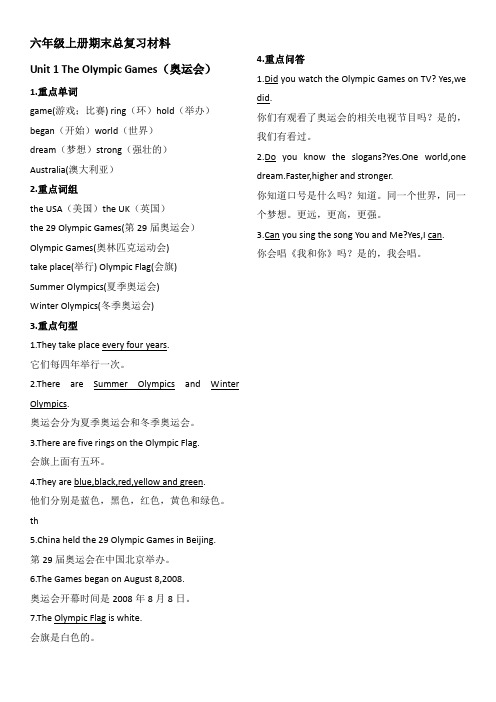
六年级上册期末总复习材料Unit 1 The Olympic Games(奥运会)1.重点单词game(游戏;比赛) ring(环)hold(举办)began(开始)world(世界)dream(梦想)strong(强壮的)Australia(澳大利亚)2.重点词组the USA(美国)the UK(英国)the 29 Olympic Games(第29届奥运会)Olympic Games(奥林匹克运动会)take place(举行) Olympic Flag(会旗)Summer Olympics(夏季奥运会)Winter Olympics(冬季奥运会)3.重点句型1.They take place every four years.它们每四年举行一次。
2.There are Summer Olympics and Winter Olympics.奥运会分为夏季奥运会和冬季奥运会。
3.There are five rings on the Olympic Flag.会旗上面有五环。
4.They are blue,black,red,yellow and green.他们分别是蓝色,黑色,红色,黄色和绿色。
th5.China held the 29 Olympic Games in Beijing.第29届奥运会在中国北京举办。
6.The Games began on August 8,2008.奥运会开幕时间是2008年8月8日。
7.The Olympic Flag is white.会旗是白色的。
4.重点问答1.Did you watch the Olympic Games on TV? Yes,we did.你们有观看了奥运会的相关电视节目吗?是的,我们有看过。
2.Do you know the slogans?Yes.One world,one dream.Faster,higher and stronger.你知道口号是什么吗?知道。
新PEP小学英语六年级总复习资料

新PEP小学英语六年级总复习资料小学英语教材所选内容均来源于学生学习及日常生活,为学生所熟悉的。
因此,教师得抓住时机,充分运用教材,从起始年级,培养学生良好的说话的习惯。
小编在这里整理了英语相关知识,快乐看看吧!新PEP小学英语六年级总复习资料一. 反义词big(大的)--- small(小的) black(黑色)---white(白色) free(闲的)---busy(忙的)hot(热)---cold(冷) same(相同的)祝福您及家人身体健康、万事如意、阖家欢乐!祝福同学们快乐成长,能够取得好成绩,为祖国奉献力量!祝福您及家人身体健康、万事如意、阖家欢乐!祝福同学们快乐成长,能够取得好成绩,为祖国奉献力量!---different(不同的) cool(凉爽)---warm(暖和)tall(高的)---short(矮的) long(长的)---short(短的) young(年轻的)---old(老的)here(这里)---there(那里) before(之前)---after(之后) new(新的)---old(旧的)二. 单词归类1.国家(country)China中国 America美国 Australia澳大利亚 Japan日本England英国 Canada加拿大 France法国2.国籍(nationality)Chinese中国人American美国人Australian澳大利亚人Japanese日本人English英国人 Canadian加拿大 French 法国人3.语言(language)Chinese汉语 Japanese日语 English英语 French 法语4.科目(subject)Chinese语文 maths 数学 English 英语 art 美术music音乐 P.E. 体育 computer 电脑 science科学5.星期(week)Sunday星期日 Monday星期一 Tuesday星期二 Wednesday星期三Thursday星期四 Friday星期五 Saturday星期六6.季节(season) spring 春天 summer夏天 autumn秋天 winter 冬天7.月份(month)January一月 February 二 March三月 April四月 May五月 June 六月July 七月August 八月September 九月October 十月November十一月 December十二月8.节日(festival)Spring Festival 春节 Dragon Boat Festival龙舟节 Mid-autumn Festival中秋节New Year’s Day元旦National Day 国庆节Children’s Day儿童节Easter复活节 Halloween万圣节 Christmas 圣诞节Women‘s Day妇女节Teacher’s Day 教师节May Day劳动节9.患病(illness): have a fever发烧hurt疼痛have a cold感冒have a toothache牙疼have a headache头疼have a sore throat喉咙疼10.食物(foods)cake蛋糕 mooncake月饼 dumpling 饺子 bread 面包 pork猪肉fish鱼肉chicken 鸡肉meat肉beef 牛肉egg鸡蛋rice米饭soup汤 salad 沙拉 sandwich三文治 pizza 比萨饼 hamburger 汉堡包 noodles 面条11.时间(time)year年month 月week周date日期day 白天hour 小时morning早上afternoon下午evening晚上yesterday昨天today今天tomorrow明天 next week下个周 last weekend上个周末 last year 去年 the day before yesterday前天 two months ago12.服装(clothes)T-shirt T恤衫 sweater毛衣 coat 大衣 shorts短裤 jeans牛仔裤hat帽子cap帽子 shoe鞋子 sock 短袜 glove 手套scarf 围巾dress连衣裙skirt短裙shirt衬衫13.动物(animals)chicken鸡 duck鸭 goose鹅 dog狗 cat 猫 pig猪 sheep绵羊goat 山羊horse马lion狮子tiger老虎elephant 大象snake蛇kangaroo 袋鼠 monkey 猴子bear 熊 panda熊猫 whale鲸 hen母鸡 mouse老鼠 giraffe长颈鹿 deer鹿14.颜色(colour)grey 灰色 red红色 green绿色 yellow黄色 blue蓝色 white白色 black黑色pink粉红色 orange橙色 brown褐色 purple紫色15.饮料(drinks):juice汁 milk 牛奶 Coke可乐 tea茶 coffee 咖啡 water 水16.数字基数词:one 一 two 二 three三 four四 five五 six 六 seven七eight八 nine 九 ten十 eleven 十一 twelve 十二 thirteen 十三 fifteen 十五 twenty二十thirty 三十 forty 四十 fifty五十 hundred 百 thousand 千 million 百万序数词:first 第一 second第二 third第三 fifth第五 sixth第六seventh第七eighth第八ninth第九twelfth 第十二twentieth 第二十thirtieth第三十17.植物、水果蔬菜tree 树 flower花 grass草 fruit 水果 apple苹果 pear 梨 orange 橙 banana 香蕉 grape葡萄 peach桃子 strawberry草莓watermelon 西瓜pineapple菠萝vegetable蔬菜tomato西红柿potato马铃薯onion洋葱 cabbage卷心菜 green beans豆角18.职业(jobs)worker工人 farmer农民 doctor医生 nurse护士 teacher 教师driver司机 cook厨师 police officer警察 singer歌唱家cleaner清洁工postman邮递员fisherman 渔夫pilot飞行员coach教练businessman商人19、自然界sun太阳 moon月亮 star星星 sky天空 river江河 lake 湖 sea大海 hill山mountain山脉 snow雪 wind风 cloud云 rain雨20、天气(weather)sunny阳光明媚的windy有风的cloudy多云的snowy下雪的rainy下雨的 dry干燥的wet湿的 warm暖的 cool凉爽的 cold冷的 hot热的21、人体部分head头 hair头发 hand手 face脸 eye眼 ear耳朵 nose鼻子 leg 腿 foot脚22、人people人们 man男人 woman妇女 child小孩 grandparents祖父母 parents父母 father父亲 mother母亲 sister姐妹 brother兄弟cousin堂兄 uncle舅舅、叔叔 aunt阿姨23、文具pen钢笔 pencil铅笔 rubber橡皮 ruler尺 knife小刀 map地图dictionary字典24、建筑与房屋部分bedroom卧室living-room客厅kitchen厨房study书房washroom 卫生间 garden花园 office办公室 bank银行 school学校hospital医院cinema电影院park公园zoo动物园shop商店bookstore书店supermarket超市library图书馆museum博物馆post office邮局TV station电视台hotel宾馆wall墙floor 地板window 窗 door门25.日用品lamp台灯 light灯 telephone电话 clock钟 fridge冰箱 cup杯glass玻璃杯 box盒子 bowl碗26.方位词left左 right右 in front of 在前面 behind后面 near附近 next to与相邻27.家具bed床 desk书桌 table桌子 chair椅子 shelf 书架sofa沙发28.餐食meal一顿饭 breakfast早餐 lunch 午餐 dinner晚餐29.交通工具bus公共汽车 train火车 car小汽车 bike自行 ship轮船 boat小船 plane飞机 ferry轮渡 subway地铁 taxi出租车30.外貌tall高的 short矮的 fat胖的 thin 瘦的healthy健康的 nice好看的 beautiful(pretty)美丽的strong强壮的 old 老的 young 年轻的 heavy重的31.性格clever(smart)聪明的active活跃的quiet安静的shy 害羞的hard-working勤奋的strict严厉的kind和蔼的polile 有礼貌的helpful乐于助人的能干的四.动词词组go shopping去购物 go fishing去钓鱼 go boating去划船 go swimming 去游泳go skiing 去滑雪 go skating去溜冰 go for a walk 去散步 go hiking去远足 go on a picnic去野餐 go camping去野营 go to the cinema 去看电影 go to bed去睡觉 go to school去上学 go to work 去上班 go back回来 go out出去play football 踢足球play basketball打篮球play table tennis(play ping-pong)打乒乓球play badminton 打羽毛球 play the piano 弹钢琴 play games 玩游戏 write a letter写信listen to music听音乐 watch TV 看电视 see a film 看电影 take photos(pictures)照相clean the room打扫房间 wash clothes洗衣服 draw a picture 画画 have breakfast 吃早餐 have lunch 吃午餐 have dinner 吃晚饭do housework 做家务do my homework做作业have a Chinese lesson 上语文课take a dancing class上舞蹈课do morning exercises晨练pick apples 摘苹果plant trees种树wait for等候make cakes 做蛋糕 make the bed 铺床make a card 做卡片look for 寻找 put on穿上 wake up醒来 get up 起床五. 介词短语a pair of 一双 a lot of 许多 on the farm在农场 in front of在…前面 in the sky 在空中 on foot步行 in the morning 在早上in the afternoon在下午 in the evening在晚上 at night在晚上 at school 在学校 at home在家六、易错词汇1. a, an的选择: 元音字母开头的单词用an,辅音字母开头的单词用a.2. am , is , are的选择: I 用 am , you 用 are. 第三人称单数用is , 复数都用are.3. have , has 的选择: 表示某人有某物。
小学六年级英语总复习资料
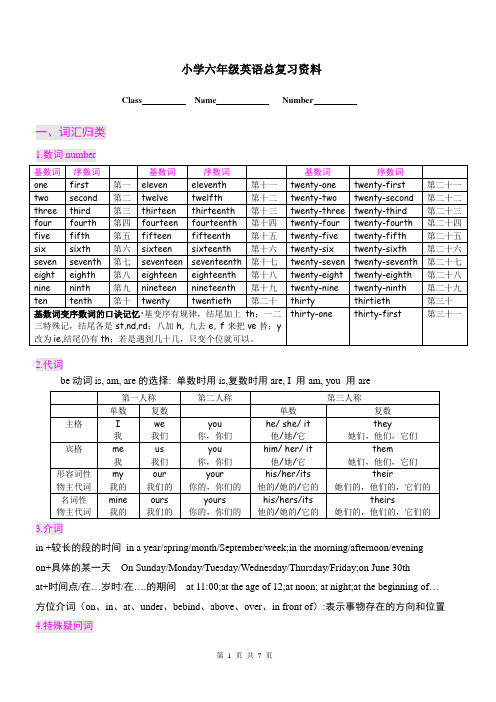
小学六年级英语总复习资料Class Name Number一、词汇归类1.数词number2.代词be动词is, am, are的选择: 单数时用is,复数时用are, I 用am, you 用are3.介词in +较长的段的时间in a year/spring/month/September/week;in the morning/afternoon/eveningon+具体的某一天On Sunday/Monday/Tuesday/Wednesday/Thursday/Friday;on June 30that+时间点/在…岁时/在….的期间at 11:00;at the age of 12;at noon; at night;at the beginning of…方位介词(on、in、at、under、bebind、above、over、in front of):表示事物存在的方向和位置4.特殊疑问词5.同音词I—eye, for—four, where—wear, pear—pair, see—sea, right-- write board—bored, sun—son, hour—our, one—won, here—hear, deer—dear, no—know, there—their, to-- too—two, by-- bye—buy6.缩写形式与完整形式isn’t=is not aren’t=are not I’m=I am it’s=it is can’t=can not could not=couldn’t she’s=she is he’s=he is you’re=you are we’re=we are don’t=do not doesn’t=does not they’re=they are what’s=what is who’s=who is that’s =that is did not=didn’t let’s=let us 二、Let’s spell三、语法点归类1.名词的运用单数名词:一般情况下用a可数名词以元音开头的单词用an (元音字母有:a e i o u)(如:an umbrella/ apple/egg/e-mail/ice cream/orange/umbrella/ elephant)复数名词:一般在词尾加s不可数名词如meat/milk/juice/water/tea/coffee/ soup2.名词单数变复数的规则3.形容词的比较级①形容词比较级的运用:将两个事物或人进行比较要用比较级,句型结构:4.四种时态(一般现在时、现在进行时、一般过去时、一般将来时)⑴一般现在时①用法:表示经常反复发生的动作、存在的状态或习惯性的动作的时态。
小学六年级英语总复习资料(Word版,)

小学六年级英语总复习资料(Word版,)六年级英语总复资料小学英语总复一:学生易错词汇1. a, an的选择:元音字母开头的单词用an,辅音字母开头的单词用a.2 am , is , are的选择:单数用is ,复数用are. I用am , you用are.3 have , has的选择:表示某人有某物。
单数用has ,复数用have. I ,you用have .4. there is, there are的选择:表示某地有某物,某人。
单数用there is ,复数用there are.5. some, any的选择:肯定句用some,疑问句和否定句用any.6.疑问词的选择:what (什么) who (谁)where (哪里)whose (谁的) why(为什么)when(什么时候)which(哪一个)how old (多大) how many(多少)how much(多少钱)二:形容词比较级详解当我们需要对事物作出比较时,需要用到比较级。
比较级的句子结构通常是:甚么+动词be (am , is , are ) +描述词比力级+ than(比)+甚么,如:I’m XXX.(我比你更高和更重。
)XXX.(一只大象比一只老虎更大。
)形容词的比较级是在形容词的基础上变化而来的,它的变化规则是:①普通的间接在词尾加er,如tall - taller , strong - stronger ,②以e结尾的,直接加r,如fine–finer ,③以辅音字母加y结尾的,先改y为i再加er,如funny - funnier④双写最后的字母再加er,如big–bigger, XXX–thinner ,hot–hotter☆注意☆比较的两者应该是互相对应的可比较的东西。
典范毛病:XXX.(我的头发比你更长。
)比较的两者是我的头发、你(整个人),那么比较的对象就没有可比性。
应该改为:XXX或XXX.比较级专项练一、从方框中选出合适的单词完成句子heavytalllongbig(1) Howis the Yellow River?(2) Howis Mr Green?He’s 175cm.(3) Howare your feet?I wear size 18.(4)Howis the fish? It’s 2kg.2、按照句意写出所缺的单词(1) I’m 12 years old. You’re 14. I’mthan you.(2) XXX.(3) XXX.(4) XXX.(5) XXX.三、根据中文完成句子.(1)?我比我的弟弟大三岁.I’XXX.(2)?这棵树要比那棵树高.XXX.(3)?你比他矮四厘米.XXX.(4)?谁比你重?than you?四、根据答句写出问句(1)I’m 160 cm.(2)I’m 12 years old.(4)Amy’s hair is 30 cm long.三:动词过去式详解动词的过去式的构成规则有:A、规则动词①普通间接在动词的背面加ed如worked , learned , cleaned , visited②以e末端的动词间接加d如lived , danced , used③以辅音字母加y结尾的动词要改y为i再加ed(此类动词较少)如study–studiedcarry–carried worry–worried(play、stay)④双写末了一个字母(此类动词较少)如stoppedB、不划定规矩动词(此类词并没有划定规矩,须熟记)小学阶段要记着以下动词的真相和曩昔式:sing–sang ,eat–ate , see–saw , have–had , do–did , go–went , take–took , buy–bought , get–got , read–read ,fly–flew , am/is–was ,are–were , say–said , leave–left , swim–swam , tell–told , draw–drew , come–came ,lose–lost , find–found , drink–drank , hurt–hurt , XXX–felt四:动词现在分词详解动词的ing形式的构成规则:①一般的直接在后面加上ing ,如doing , going , working , singing , eating②以e结尾的动词,要先去e再加ing,如having , writing③双写最后一个字母的(此类动词极少)有:running , swimming , sitting , getting五:人称和数人称代词物主代词主格宾格第一人称单数I(我)me my(我的)复数we(我们)us our (我们的)第二人称单数you(你)you your(你的)复数you(你们)you your(你们的)第三人称单数he(他)him his(他的)she(她)her her(她的)it(它)it its(它的)复数they(他们/她们/它们)them their(他们的/她们的/它们的)六:句型专项归类肯定句:是指用肯定的语气来陈述的句子,如:I’XXX.There are four fans in our classroom.He will eat XXX at 12:00.XXX.2、否定句:含有否定词或表示否定意义词的句子,如:I’m not a student.She is not (isn’t)a doctor.He does not (doesn’t) work in a hospital.There are not (aren’t) four XXX.He will not (won’t) eat lunch at 12:00.I did not (didn’t) watch TV XXX.☆注意☆小结:否定句主要是在肯定句的基础上加上了否定词“not”。
六年级上册英语复资料

六年级上册英语复资料以下是六年级上册英语复习资料,包括一些重点词汇、短语和句子,以及一些常见的语法知识点。
重点词汇:1. subject 科目2. math 数学3. science 科学4. social studies 社会研究5. English 英语6. Chinese 语文7. music 音乐8. art 美术9. physical education 体育10. library 图书馆常见短语:1. have a good day 过得愉快2. see you later 待会儿见3. have a good time 过得开心4. let me know 让我知道5. have a look 看一看6. have a seat 请坐7. what about you 你呢8. I don’t know 我不知道9. I think so 我认为如此10. I’m not sure 我不能确定常见句子:1. What’s your favorite subject? 你最喜欢的科目是什么?2. I like math because it’s fun. 我喜欢数学因为它很有趣。
3. Do you like science? 你喜欢科学吗?4. Yes, I do. 是的,我喜欢。
5. No, I don’t. 不,我不喜欢。
6. What’s your favorite sport? 你最喜欢的运动是什么?7. My favorite sport is basketball. 我最喜欢的运动是篮球。
8. When do you usually get up? 你通常什么时候起床?9. I usually g et up at 7 o’clock. 我通常在7点钟起床。
10. How many hours do you sleep every night? 你每晚睡多少小时?语法知识点:1. 现在进行时:表示正在进行的动作或状态,结构为“be动词+动词ing”。
(完整版)人教版(PEP)小学英语六年级上册复习资料
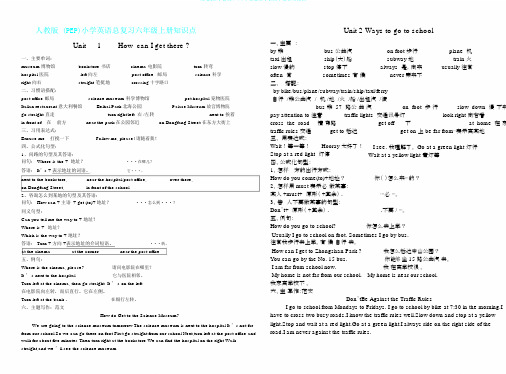
人教版 (PEP)小学英语总复习六年级上册知识点Unit1How can I get there ?一、主要单词:museum 博物馆bookstore 书店cinema 电影院turn 转弯hospital 医院left 向左post office邮局science 科学right 向右straight 笔挺地crossing 十字路口二、习惯语搭配:post office 邮局science museum 科学博物馆pet hospital 宠物医院Italian restaurant 意大利餐馆Beihai Park 北海公园Palace Museum 故宫博物院go straight 直走turn right/left 右 /左转next to 挨着in front of... 在 ...前方near the park 在公园邻近on Dongfang Street 在东方大街上三、习用表达式:Unit 2 Ways to go to school一、主要:by 乘bus 公共汽on foot 步行plane 机taxi 出租ship(大)船subway 地train 火slow 慢的stop 停下always 是,向来usually 往常often 常sometimes 有候never 素来不二、搭配:by bike/bus/plane/subway/train/ship/taxi/ferry自行 /乘公共汽 / 机 /地 /火 /船 /出租汽 /渡bus 乘 57 路公共汽on foot 步行slow down 慢下来pay attention to 注意traffic lights 交通讯号灯look right 向右看cross the road横穿路get off下at home 在家traffic rules 交通get to 抵达get on 上be far from⋯表示离某地Excuse me打搅一下Follow me, please! 请随着我!四、公式化句型:1、问路的句型及其答语:问句: Where is the + 地址?···在哪儿?答语: It’s + 表示地址的词语。
小学六年级英语全册总复习资料

小学六年级英语知识点复习一、知识点归纳1、动词变第三人称单数规则(与名词变复数的规则大致相同)①大多数动词在词尾加“S”。
如:①stop-stops [s] ; make-makes [s] ②read-reads [z] ; play-plays [z]②以辅音字母加“y”结尾的,要先将“y”变为“i”,然后再加“es”读[iz] 如:fly-flies [z];carry-carries [z] study-studies [z]; worry-worries③以“s, x, ch, sh”结尾的,在词尾加“es”,发音为[iz] 如:teach-teaches [iz];watch-watches [iz]④以“辅音字母+o”结尾的动词,加“es”,读[z] 如:go-goes [z] do-does [z]下面几个动词变为单数时,原词的元音部分的发音发生了较大的变化,请注意记忆。
如:1、do [du:]-does [dz] 2、say [sei]-says [sez]练习,把下列动词变为第三人称单数catch-- ___________ push--_________ play--___________look--____________ enjoy--__________ go--_____________2、名词变复数的特殊形式:man—men woman—women man teacher—menteachers woman teacher—women teachers child(孩子)—children foot—feet tooth—teeth goose—geese mouse—mice附加:以f或fe 结尾的名词变复数时,常去f, fe 加ves,如:half---halves knife---knives leaf---leaves单复同形,如deer,sheep,fish,Chinese,Japanese练习,把下列名词变为复数形式factory--__________ sheep--___________ hobby--___________Zoo--____________ box___________ tomato--__________man--___________ foot--________ tooth--__________boy--___________ photo--_________ leaf--___________3\动词的现在分词的变化规则①一般情况下,直接在动词后加-ing 如:work ---working sleep ---sleeping study ---- studying②动词以不发音的-e结尾,要去-e加-ing 如:take ----taking make ----making dance ---dancing③重读闭音节的动词,要双写词尾字母,再加-ing 如:run—running swim—swimmingget—getting cut ----- cutting put ----- putting begin ------ beginning sit—sitting练习,把下列动词变为现在分词fly-- ________ sing ---__________ take--_________ see ---________ climb--________ swim---_________ read--________ run--________ 4、形容词或副词变成比较级规则1)一般在形容词或副词后面直接加–er 变为比较级。
部编版小学六年级英语总复习资料(含答案)
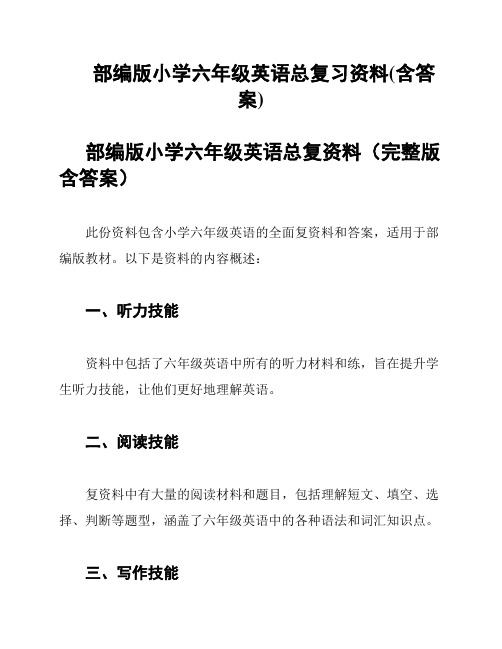
部编版小学六年级英语总复习资料(含答
案)
部编版小学六年级英语总复资料(完整版含答案)
此份资料包含小学六年级英语的全面复资料和答案,适用于部编版教材。
以下是资料的内容概述:
一、听力技能
资料中包括了六年级英语中所有的听力材料和练,旨在提升学生听力技能,让他们更好地理解英语。
二、阅读技能
复资料中有大量的阅读材料和题目,包括理解短文、填空、选择、判断等题型,涵盖了六年级英语中的各种语法和词汇知识点。
三、写作技能
资料中共有35个写作任务,每个任务包括了写作指导、范文和练题。
这些练旨在提高学生的写作能力,让他们能够独立地运用英语进行表达。
四、语言知识点
复资料中还包括了小学六年级英语的所有语法和词汇知识点,其中每个知识点都有详细的讲解和例句,并提供了丰富的练题,帮助学生巩固所学知识。
五、完整的答案
资料中提供了所有练题的答案,包括听力练和阅读练、写作和语言知识点的练,方便学生自行核对。
总的来说,此份资料是一份全面、详细的小学六年级英语复习资料,适用于需要全面回顾英语知识点的学生,也适用于备战期末考试的学生。
希望此资料能够帮助到大家。
新PEP六年级英语总复习及练习精选全文完整版

可编辑修改精选全文完整版六年级英语毕业总复习一单词名词动词形容词可数不可数原型进行式过去式第三人称单数原型比较级apple water do doing did does fat fatter(将来时、一般现在时)(一般现在时)单数复数apple apples一、定义:名词可以分为可数名词和不可数名词,不可数名词没有单复数,一律看作单数。
二、可数名词:分为单数和复数⑴单数:以元音音标a e i o u 开头的单数用an(一个),其他用a(一个)或者one +单数复数:some(一些)加复数或者不可数名词;或者大于1的具体数字+复数⑵可数名词单数→复数的变化规则:三、不可数名词:以下词为常为不可数名词,他们的复数形式就是他们本身。
water 水milk牛奶tea 茶rice米饭juice 果汁bread面包meat 肉四、人称代词:be 动词am , is , are的选择: 单数用is , 复数用are,I 用am , you 用are.练习题一、选择a或an或some.pen bag apple big applebananas orange books water二、写出下列各词的复数.watch _______ child _______ day________ foot________ book_______ sheep ______ box_______ peach______ man______fish _______ paper_______三、选择:1、There on the wall .They are very beautiful.A. are photoesB. are photos2、That’s book.A. anB. a3、There some in the river.A. are, fishesB. are ,fish4. Would you like _______ ,please?A. some watersB. some water5、Do you want to drink much ?A、a milkB、milk四、选择be(am is are ) 填空。
(完整版)小学六年级人教版英语总复习及知识点
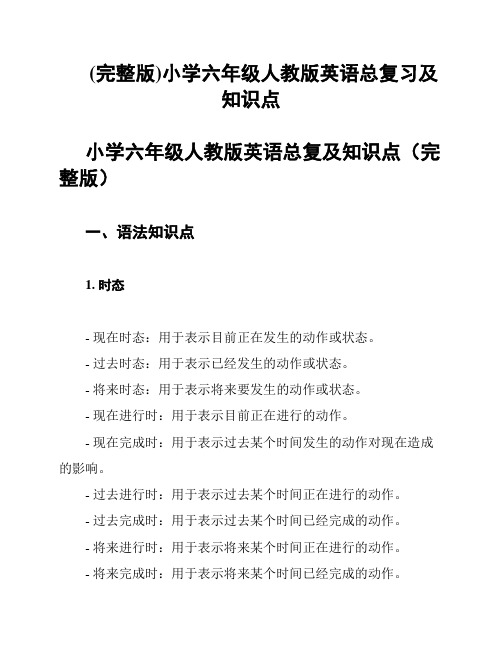
(完整版)小学六年级人教版英语总复习及知识点小学六年级人教版英语总复及知识点(完整版)一、语法知识点1. 时态- 现在时态:用于表示目前正在发生的动作或状态。
- 过去时态:用于表示已经发生的动作或状态。
- 将来时态:用于表示将来要发生的动作或状态。
- 现在进行时:用于表示目前正在进行的动作。
- 现在完成时:用于表示过去某个时间发生的动作对现在造成的影响。
- 过去进行时:用于表示过去某个时间正在进行的动作。
- 过去完成时:用于表示过去某个时间已经完成的动作。
- 将来进行时:用于表示将来某个时间正在进行的动作。
- 将来完成时:用于表示将来某个时间已经完成的动作。
2. 语法结构- 名词:用于表示人、动物、物体、地点等。
- 动词:用于表示动作或状态。
- 形容词:用于描述名词的特征或状态。
- 副词:用于修饰动词、形容词或其他副词。
- 介词:用于表示位置、时间或关系等。
- 代词:用于替代名词。
- 数词:用于表示数量。
- 冠词:用于限定名词的范围。
- 连词:用于连接词语、短语或句子。
3. 句子结构- 主语:句子中执行动作或承受动作的人或事物。
- 谓语:句子中说明主语动作或状态的部分。
- 宾语:句子中接受动作的人或事物。
- 定语:用于修饰名词或代词的成分。
- 状语:用于修饰动词、形容词、副词或整个句子的成分。
- 表语:用于说明主语的状态或特征的部分。
二、总复内容1. 单词- 请根据教材中的单词表,复并牢记相关的单词拼写和意思。
2. 句子- 复教材中的对话和句子,理解并掌握其基本意思和用法。
3. 对话- 复教材中的对话,掌握其中的日常生活用语和表达方式。
4. 语法- 复教材中的语法知识点,加深对时态、语法结构和句子成分的理解。
三、研究方法1. 多听多说- 多听英语教材、歌曲或英语广播,提高听力水平。
- 多说英语,练口语表达和语音准确性。
2. 多读多写- 多读英语教材、故事书等,提高阅读理解能力。
- 多写英语作文,锻炼自己的写作能力和语法运用。
六年级英语总复习资料

六年级英语总复习资料-CAL-FENGHAI.-(YICAI)-Company One1PEP小学英语词汇文具和学校用品;pen 钢笔pencil 铅笔pencil-case 铅笔盒ruler 尺子eraser 橡皮crayon 蜡笔book 书bag 书包sharpener 卷笔刀comic book漫画书 post card明信片newspaper报纸ball 球football足球kite 风筝balloon 气球desk 课桌window-窗户 Chinese book-语文书 English book-英语书math book-数学书story-book-故事书 notebook-笔记本 ball 球football足球kite 风筝balloon 气球desk 课桌window-窗户chair 椅子walkman 随身听picture-画,图画schoolbag书包teacher’s desk-讲台classroom教室 computer计算机 board写字板 fan风扇seat-座位 door -门课程:math数学 Chinese语文 English英语P.E.体育music音乐家居:lamp 台灯light-灯,灯管 floor-地板 wall-墙curtain 窗帘trash bin 垃圾箱 closet 壁橱 mirror 镜子 end table 床头柜 bedroom 卧室 kitchen 厨房 bathroom 卫生间 living room 客厅study书房身体部位:head 头face 脸nose 鼻子mouth 嘴eye 眼睛ear 耳朵arm 胳膊finger 手指leg 腿foot 脚body 身体颜色:red 红色的yellow 黄色的green 绿色的blue 蓝色的 purple 紫色的white 白色的black 黑色的orange 橙色的pink 粉色的brown 棕色的的 white白色的colour 颜色动物:cat 猫dog 狗monkey 猴子panda 熊猫rabbit 兔子duck 鸭子pig 猪bird 鸟bear 熊elephant 大象mouse 老鼠squirrel 松鼠giraffe 长颈鹿deer 鹿cat猫 rabbi兔子 pig猪 duck鸭子 horse马 dog狗kangaroo 袋鼠食物:cake 蛋糕bread 面包hot dog 热狗hamburger 汉堡包chicken 鸡肉French fries 炸薯条Coke 可乐juice 果汁milk 牛奶water 水tea 茶coffee 咖啡eggplant 茄子fish 鱼green beans 青豆tofu 豆腐potato 土豆tomato 西红柿lunch 中餐honey 蜂蜜人物:father 父亲;爸爸dad 爸爸口语 mother 母亲;妈妈mom 妈妈口语 man 男人woman 女人grandmother 外祖母grandma 口语外祖母grandfather 外祖父grandpa 口语外祖父sister 姐妹brother 兄妹Mr. 先生 uncle 叔叔;舅舅 mom 妈妈grandpa爷爷;外公boy 男孩 girl 女孩 friend 朋友classmate-同学水果:peach 桃pear 梨orange 橙子watermelon 西瓜apple 苹果banana 香蕉 orange橙子 strawberry 草莓grape 葡萄数字;one 一two 二three 三four 四five 五six 六seven 七eight 八nine 九ten 十leven 十一twelve 十二thirteen 十三fourteen 十四fifteen 十五sixteen 十六seventeen 十七eighteen 十八nineteen 十九twenty 二十twenty-one-二十一 thirty-one-三十一 forty-one-四十一 fifty-五十服装:clothes 衣服jacket夹克衫 shirt衬衫 skirt裙子 dress连衣裙 T-shirtT恤衫 shirt衬衫 jeans牛仔裤 pants长裤 socks袜子 shoes鞋子交通用具:boat 小船car 小汽车plane 飞机bus 公共汽车bike 自行车taxi 出租车jeep 吉普车by 经,乘 foot脚 bike自行车 bus公共汽车 train火车 traffic 交通 traffic light 交通灯 traffic rule 交通规则 stop 停,停车站地点单词zoo 动物园river 河流 flower 花 grass 草 lake 湖泊 forest 森林 path 路 park 公园 picture 照片 house 房子 bridge 桥 tree 树 road 公路 building 建筑物 library图书馆 post office邮局 hospital医院 cinema电影院 bookstore书店 school学校国家China/PRC America/USA England Canada/CAN疑问词: when 什么时候how many 多少 which 哪一个how怎样 what 什么 what colour 什么颜色 what time 几点what day 星期几how old 年龄多大、几岁how many 多少how much 多少钱 how tall 多高 how heavy 多重 how long 多长 how big 多大 how large 面积多大 who 谁 whose 谁的 where 在哪里 why 为什么 which 哪一个介词:in-在......里面 like 像、in 在…里面 on 在…上面,在…..时候 under 在…下面 near 在..旁边 behind 在…后边 for 为 at 在……点钟 near-在......的旁边 next to与…相邻 ..连词:but但是 because 因为 then然后 and 和;星期:Monday 星期一Tuesday 星期二Wednesday 星期三Thursday 星期四 Friday 星期五 Saturday 星期六 Sunday 星期天 day 天时间和季节:time时间 evening 夜晚;晚上 noon 中午 weekend 周末 spring 春天summer 夏天fall 秋天winter 冬天season 季节next week下周末last weekend 上一个周this morning今天上午this afternoon今天下午this evening 今天晚上o’clock…点钟birthday 生日 date 日期 today今天月份:Jan./January 一月 Feb./February 二月 Mar./March 三月 Apr./April 四月 May 五月 June 六月 July 七月 Aug./August 八月 Sept./September 九月 Oct./October 十月 Nov./November 十一月 Dec./December 十二月自然界:rain雨cloud 云sun太阳stream河,溪come from来自,从…来 seed种子 soil土壤 sprout 苗,芽 plant植物,种植职业:singer歌唱家,歌手writer作家actor男演员actress女演员artist画家TV reporter电视台记者engineer工程师accountant会计policeman男警察 salesperson销售员 cleaner清洁工 teacher 教师student 学生疾病:have a fever 发烧 have a sore throat喉咙疼 have a cold感冒 have a toothache 牙疼 have a headache 头疼 sore 疼的 hurt疼痛问候语: good morning 早上好good afternoon 下午好goodbye 再见其它:this 这个并且doll 玩具娃娃some 一些;某些 no不;不是 not不;不是的 right 右边left左边this这;这个that那;那个yes是;是的good idea-好主意all right-好吧,好的the-这个,这里 hobby爱好.good job-干的好there 那儿,那里; does 做 too many-太多了 -sure-当然可以 sorry-对不起here you are-给你 no不;不是 not不;不是的 please请 matter事情,麻烦缩写形式:aren’t=are not let’s=let us 让我们I’m=I am 我是it’s=it is they are=they’re 他们是doesn’t=does notwhat’s=what is动词:look at 看;瞧like 喜欢thanks 多谢meet 遇见;碰见 have有go去play玩;踢 get up起床 wait等待turn转弯swim 游泳 climb 往上爬 fight 打架 swing 荡;荡秋千sleep 睡觉 fly 飞 jump 跳 walk 走 run 跑 see-看get—got 到达clean-打扫,清洁,擦干净的work 工作 buy购买动词词组:get to到达have a look看一看do morning exercises晨练 eat breakfast吃早饭 have an English class上英语课play sports进行体育运动 eat dinner吃晚饭have 有、吃do homework 做作业 watch TV 看电视 read books 读书cook the meals 做饭 water the flowers 浇花 sweep the floor 扫地 clean the bedroom 打扫卧室 make the bed 铺床 set the table 摆饭桌wash the clothes 洗衣服 do the dishes 洗碗碟use a computer 使用计算机 climb mountains爬山 go shopping购物;买东西 play the piano弹钢琴 visit grandparents看望祖父母 go hiking 去远足 take pictures 照相 watch insects 观察昆虫 pick up leaves 采摘树叶 do an experiment 做实验 catch butterfly 捉蝴蝶 count insects 数昆虫 collect leaves 收集树叶 write a report 写报告 play chess 下棋 have a picnic 举行野餐 fly kites 放风筝 skate 滑冰;滑冰鞋 make a snowman 堆雪人 plant trees 种树 drink water 喝水 draw pictures 画画 cook dinner 做饭 read a book 看书 answer the phone 接电话 listen to music 听音乐clean the room 打扫房间 write a letter 写信 write an e-mail 写电子邮件empty the trash倒垃圾ride a bike--riding a bike骑自行车 dive--diving跳水 play the violin—playing the violin拉小提琴make kites—making kites制作风筝collect stamps—collecting stamps集邮live –lives居住teach--teaches教go--goes去watch--watches 看 read--reads读,看动词过去式形式:learn Chinese—learned Chinese学汉语sing and dance—sang and danced 唱歌和跳舞 eat good food—ate good food吃好吃的食物 take pictures—took pictures 照相climb—climbed 爬have—had buy presents—bought presents买礼物row a boat—rowed a boat 划船see elephant—saw elephant 看大象 go skiing—went skiing 去滑雪 go ice-skating—went ice-skating 去滑冰go to school 上学 -went to schoo 上学 lwatch—watched 看 wash—washed 洗clean—cleaned打扫play—played玩visit—visited 看望do做—did 做go—went去 go to a park—went to a park 去公园 go swimming—went swimming去游泳 go fishing—went fishing去钓鱼 read—read 读 go hiking—went hiking 去郊游形容词:n ice 好的;愉快的great 太好了small 小的big 大的long 长的short短的;矮的tall 高的new-新的warm暖和的 cold寒冷的 cool凉爽的 fat-胖的 heavy-重的;沉重的young 年轻的 funny 滑稽可笑的 tall 高的 strong 强壮的 kind 和蔼的、亲切的 old 年老的 short 矮的 thin 瘦的 strict 严格的 smart 聪明的、巧妙的 active 积极的、活跃的 quiet 安静的、文静的 tasty 好吃的 sweet 甜的 sour 酸的 fresh 新鲜的 salty 咸的 favorite 最喜欢的 best 最;极 many-许多的 snowy下雪的 sunny晴朗的 clean 干净的last 上一个的,仅余的,留在最后的tired疲劳的,累的 excited兴奋的 angry 生气的 happy高兴的 bored无聊的,烦人的 sad 忧伤的,悲伤的形容词比较级:tall—taller更高的short—shorter 更矮的strong—stronger 更强壮的old—older 年龄更大的young—younger 更年轻的big—bigger 更大的heavy—heavier 更重的 long—longer 更长的 thin—thinner 更瘦的 small—smaller 体型更小的形容词性物主代词your 你的;你们的my我的 our-我们的人称代词:宾格me-我us我们you你,你们her 她的him 他it 它them 他们主格you-你we-我们I-我they 它他、她们; it它; he他; she她情态动词:can 能够;可以may -可以should应该 ; must应该 ;副词:really 真地;确切地very 很、非常often 经常sometimes 有时候usually 通常;一般 too 也;太straight成直线地be动词am is are was werePEP 四会句子小学英语主要句型归类三年级上册----六年级下册I 询问姓名、年龄。
六年级复习资料(英语).doc

tall (原形)- taller (比较级)- tallest (最高级)long (原形)- longer (比较级)-longest (最高级)big (原形)-bigger (比较级)-biggest (最高级)注意:比较的两者应该是互相对应的可比较的东西五、时态:小学阶段一共学了四种时态,分别是:一般现在时,一般将来时,现在进行时,一般过去时。
下面我们一一进行总结。
1、一般现在时A、表示不受时限的客观存在如:He is a boy. 他是一个男孩。
She is a student. 她是一个学生。
My mother is a nurse.我的母亲是一个护士。
This is a dog.这是一条狗。
I have a story-book, o 我有一本故事书。
B、表示现在的习惯动作,即指现在经常发生的动作,一般现在时常用来表示现在时间里某种动作的经常性和习惯性。
它常与表示程度或频度的词连用,如:often (经常),usually (通常),sometimes (有时),always (总是),never (从不)如:I often go to school on foot.我经常步行去学校。
My father works in a school.我的父亲在一所学校工作Mike watches TV every day.麦克每天都看电视。
I usually play computer games on the weekend. 我通常在周末玩电游。
C、表示现时的状态和现在瞬间动作如:How are you? You look happy.你好吗?你看起来很开心。
What's the matter with you? I have a headache.你怎么啦!我头疼。
What do you have for lunch? I have some chicken.你中餐吃什么啊?我吃一些鸡肉。
- 1、下载文档前请自行甄别文档内容的完整性,平台不提供额外的编辑、内容补充、找答案等附加服务。
- 2、"仅部分预览"的文档,不可在线预览部分如存在完整性等问题,可反馈申请退款(可完整预览的文档不适用该条件!)。
- 3、如文档侵犯您的权益,请联系客服反馈,我们会尽快为您处理(人工客服工作时间:9:00-18:30)。
小学六年级英语知识点复习一、知识点归纳1、动词变第三人称单数规则(与名词变复数的规则大致相同)①大多数动词在词尾加“S”。
如:①stop-stops [s] ; make-makes [s] ②read-reads [z] ; play-plays [z]②以辅音字母加“y”结尾的,要先将“y”变为“i”,然后再加“es”读[iz] 如:fly-flies [z];carry-carries [z] study-studies [z]; worry-worries③以“s, x, ch, sh”结尾的,在词尾加“es”,发音为[iz] 如:teach-teaches [iz];watch-watches [iz]④以“辅音字母+o”结尾的动词,加“es”,读[z] 如:go-goes [z] do-does [z]下面几个动词变为单数时,原词的元音部分的发音发生了较大的变化,请注意记忆。
如:1、do [du:]-does [dz] 2、say [sei]-says [sez]练习,把下列动词变为第三人称单数catch-- ___________ push--_________ play--___________look--____________ enjoy--__________ go--_____________2、名词变复数的特殊形式:man—men woman—women man teacher—menteachers woman teacher—women teachers child(孩子)—children foot—feet tooth—teeth goose—geese mouse—mice附加:以f或fe 结尾的名词变复数时,常去f, fe 加ves,如:half---halves knife---knives leaf---leaves单复同形,如deer,sheep,fish,Chinese,Japanese练习,把下列名词变为复数形式factory--__________ sheep--___________ hobby--___________Zoo--____________ box___________ tomato--__________man--___________ foot--________ tooth--__________boy--___________ photo--_________ leaf--___________3\动词的现在分词的变化规则①一般情况下,直接在动词后加-ing 如:work ---working sleep ---sleeping study ---- studying②动词以不发音的-e结尾,要去-e加-ing 如:take ----taking make ----making dance ---dancing③重读闭音节的动词,要双写词尾字母,再加-ing 如:run—running swim—swimmingget—getting cut ----- cutting put ----- putting begin ------ beginning sit—sitting练习,把下列动词变为现在分词fly-- ________ sing ---__________ take--_________ see ---________ climb--________ swim---_________ read--________ run--________ 4、形容词或副词变成比较级规则1)一般在形容词或副词后面直接加–er 变为比较级。
如:old—olderhigh—higher2)以“辅音字母+y”结尾的单词,则将改y为i 再加-er变为比较级。
heavy—heavier easy-- easier3)以字母e 结尾的单词,直接加–r 变为比较级.如:nice—nicer4)以重读闭音节结尾,且末尾只有一个辅音字母的,则双写最后一个辅音字母,再加-er变为比较级. 如: fat—fatter thin—thinner big---bigger red---redder hot—hotter wet—wetter5) 特殊比较级:good—better many/ much---more far—farther练习,把下列词变为比较级形式early--_________ heavy--___________ old--_________ tall---___________ many--_________ good--___________ thin---_________ fat--____________ large--_________ strong--__________ hot--__________ big--___________ 5、疑问词归纳:what 什么、where哪里、who谁、when什么时候、why为什么、which哪一(个、只)、how怎样练习,根据句意,用恰当的疑问词填空1)---______does your father do ?---He is an engineer.2) ---______ are you going to the zoo ? --- Tomorrow morning.3) ---______ do you go to work by bus ? ---Because my home is far.4) --- _______ do you go to school ? ---On foot.5) ---_______ monkey do you like ? ---I like the brown one.6) ---_______ are you going this afternoon ? --- I’m going to the library.7) --- _______ is the man ? --- He is my uncle.对划线部分提问1)I’m going to buy a story-book.______ ______you going to _______ ?2)I’m going to the bookstore tomorrow._______ are you _______ tomorrow ?3) Amy had a birthday party yesterday.______ did Amy ______ a birthday party ?4)I go to school by bus.______ do you _______ to school ?5) She goes to school on foot because her home is near._______ ________ she ________ to school on foot ?6) The tall man is my brother.______ man is _______ brother ?7) He is my father. 8)I’m 160cm tall.is he ? ______ _______ are you ?9) My brother is 54 kg. 10) Sam’s legs are 76cm.______ _______ is your brother ? ______ _______ _______ Sam’s legs ?综合练习(单项选择)( ) 1. –How do you go to school ?---I go to school __________because my home is near.A. by busB. by subwayC. on foot( ) 2. ---_______ can I get to the zoo ?--- You can go by bus.A. WhereB. HowC. What( ) 3. My school is _______. So I go there by subway.A. farB. nearC.big( ) 4. The traffic lights are _________ in every country.A. sameB. differentC. the same( ) 5. In England, drivers drive on the _______ side of the road.A. rightB. leftC., same( ) 6.—Let’s go to the park tomorrow. ---___________A. YesB. Thank youC. Great( ) 7. Usually I go to work by bus ______ it’s fast.A. becauseB. butC. so( ) 8. ---_______ floor do you live on ? --- The ninth floor.B. Where C . Which(A.one way.B. no entry.C. turn rightA. OKB. Good ideaC. Sure.( ) 11. ---Is there a post office near here ?---____________. It’s next to the hospital.A. Yes, there isB. No, there isC. Yes, there isn’t. ( ) 12.____ at a red light,_____ at a yellow light and ____at a green light.A. Go, stop, waitB. Stop, go, waitC. Stop, wait, go( ) 13. The hospital is _________ here. You can go by the NO. 9 bus.A. nearB. far fromC. far( ) 14. --- Thank you. ---__________.A. You’re welcomeB. GoodbyeC. Hello( ) 15. Get off _____ the cinema, then walk straight ______ five minutes.A. at, forB. on, atC. for, in( ) 16. The bookstore is _______ the supermarket.A. nextB. next toC.east( ) 17. You can ______ the NO. 5 bus to get there.A. takeB. byC. go( ) 18. Thank you for _______ me English.A. teachB. teachesC. teaching( ) 19. Please come to my _______ birthday party.A. twelfthB. twelveC. twelf( ) 20. What are you going to do ________ ?A. nowB. last weekC. next week( ) 21. ---_________________ ? --- I am going to swim.A.What are you going to do this weekendB.Where are you goingC. What can you do(, ) 22.—When are you going to the zoo ? ---__________A. I’m going to buy some booksB. I’m going to the bookstore.C. I’m going at 2:00.( ) 23.-- _________ ? --- Yes, do you have some story—books ?A. What do you wantB. Can I help youC. Where are you going ( ) 24. I’m going to buy a book _______ flowers.A. withB. forC. about( ) 25. This weekend I’m going to take a trip _______ my parents.A. andB. withC. for( ) 26. ---___________________ ----I’m going to be an engineer.A. What are you going to do?B. What do you do ?C. What do you often do ?( ) 27. ---___________________ ----I like swimming.A. What’s your hobby ?B. What do you do ?C. Which do you want ? ( ) 28. I don’t have a pen _______ pencil.A. andB. orC. but( ) 29. My mother often _________ TV in the evening.A. watchesB. watchC. watchs( ) 30. I write ______ email to my friend every week.A. aB. /C. an( ) 31. John enjoys ________ very much.A. drawB. drawingC. draws( ) 32. --- Does your brother like colleting stamps ?----__________, but he likes reading books.A. No, he doesn’tB. Yes, he doesC. No, he don’t( ) 33. My aunt sells school things. She is a __________.A. cleanerB. teacherC. salesperson( ) 34. If you like drawing and math, you can be _________.A. an artistB. an accountantC. an engineer( ) 35. ---Where does the rain come from ? --- It comes from the _______.A. vapourB. cloudsC. water( ) 36.________ the flowers to grow.A. WaitB. Wait forC. Plant( ) 37._____ several days, you can see the sprout.A. OnB. ForC. In( ) 38. The cloud _______ the vapour.A. come fromB. is come fromC. comes from( ) 39. ---_______ can the water become vapour ?--- The sun shines and the water becomes vapour.A. HowB. WhatC. Where( ) 40. I’m 150 cm tall. Amy is 156 cm tall. Amy is ______ than me.A. tallerB. shorterC. stronger( ) 41. Line up _______ shorter to taller !A. thanB. forC. from( ) 42. ----How _______ are you ? ---I’m 5 years old.A. manyB. oldC. about( ) 43. I’m 12 years old. My sister is 3 years older than me. she is ___years old.A. 9B. 13C. 15( ) 44.---How old is he ? --- He is _________.A. elevenB. 15kgC.short( ) 45. I’m 165 cm tall. I’m _______ taller than you.A. manyB. muchC. a lot( ) 46. I am______ older than you.A. one yearB. 3cmC. 2kg( ) 47. --- How big ______ your feet ? --- I wear size 25.A. areB. isC. than( ) 48.That fat boy is _______.A. 35mB. 35cmC. 45 kg( ) 49. My pencil is _______ than yours.A. happierB. youngerC. longer( ) 50 A mouse is ________ than an elephant.A. heavierB. strongerC. smaller( ) 51.My hands are bigger than _______.A. yourB. youC. yours( ) 52. You are _______ than me, but I am _______ than you.A. thinner, bigerB. thinner, biggerC. thiner, bigger( ) 53 How ______ you feel ?A. doB. doesC. are( ) 54. How are you _______ now ?A. feelingB. feelC. feels( ) 55. ---______________ ? – I have a fever.A. What are the matterB. What is the matterC. Are you OK ? ( ) 56 What’s the matter _____ Amy ?A. forB. aboutC. with( ) 57. ----How ______ Tom feel ? --- He is tired.A. doB. doesC. is( ) 58.--- My mother is ill in hospital.---- _________________.A. Oh, noB. OKC. I’m sorry to hear that( ) 59. I don’t like drawing. It’s __________A. sadB. excitingC. boring( ) 60. The baby has only two _______.A. teethB. toothC. tooths( ) 61.What ______ you do yesterday ?A. doB. didC. does( ) 62. I _______ books last night.A. readB.readedC. reads( ) 63. Did you ______ fishing yesterday ?A. wentB. goesC. go( ) 64.---______ did you do last weekend ? ---I played football.A. WhenB. WhatC. Where。
